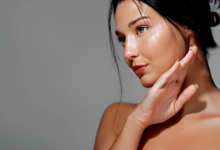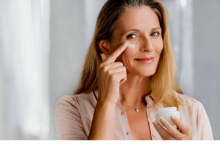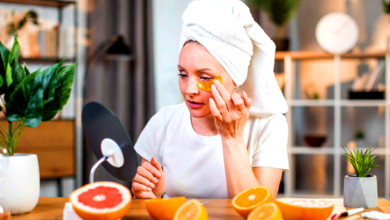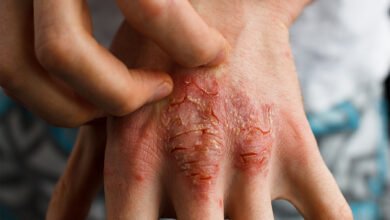How to Build an Anti-Aging Skincare Routine at Home
Anti-aging skincare routine at home Discover expert steps for youthful skin with cleansing exfoliation hydration & sun protection. Start today.

Anti-aging skincare is no longer just a luxury it’s a necessity for maintaining youthful, radiant skin as we age. With the right at-home routine, you can combat fine lines, wrinkles, and dullness while boosting hydration and elasticity. The key lies in using scientifically backed ingredients, consistent care, and protective measures to slow down visible signs of aging. Whether you’re in your 30s or beyond, a well-structured regimen can help you achieve healthier, firmer, and more glowing skin without expensive treatments.
Building an effective anti-aging skincare routine starts with understanding your skin’s changing needs. As we age, collagen production slows, moisture retention decreases, and cell turnover weakens leading to common concerns like sagging skin and age spots. Fortunately, targeted products and smart habits can make a significant difference. This guide will walk you through essential steps, from cleansing and exfoliating to hydrating and protecting your skin, ensuring a simple yet powerful routine that delivers real results. Let’s dive into how you can turn back the clock right from the comfort of your home.
How to Build an Anti-Aging Skincare Routine at Home
The Science Behind Aging Skin
As we age, our skin undergoes fundamental biological changes that contribute to visible signs of aging. Collagen production decreases by about 1% each year after our mid-20s, leading to loss of firmness and the formation of wrinkles. Simultaneously, elastin fibers weaken, reducing skin’s elasticity and bounce-back ability. The natural cell turnover process slows from about 28 days in youth to 45-60 days in our 40s and beyond, resulting in dull, uneven texture. Additionally, sebum production Anti-Aging Skincare, causing dryness and making fine lines more apparent.
Pillars of an Effective Anti-Aging Routine
A comprehensive anti-aging approach addresses these biological changes through four essential functions Cleansing Removes impurities without stripping natural oils, maintaining the skin barrier’s integrity. Hydrating Replenishes moisture using humectants (like hyaluronic acid) and emollients (like ceramides) to plump fine lines. Protecting Shields skin from environmental aggressors, primarily through daily broad-spectrum sunscreen. Repairing Stimulates collagen and cell renewal with active ingredients (retinoids, peptides, antioxidants)
Gentle Cleansing for Mature Skin
As the cornerstone of any effective anti-aging regimen, proper cleansing becomes increasingly crucial as skin matures. With aging skin’s natural thinning and heightened susceptibility to dryness, selecting the right cleanser is paramount harsh sulfate-based formulas Anti-Aging Skincare away vital lipids and compromise the moisture barrier, leading to irritation and accelerated moisture loss. The ideal anti-aging cleanser should be sulfate-free and enriched with hydrating humectants like hyaluronic acid or glycerin, which attract and bind water to the skin while cleansing. A gentle, pH-balanced formula used twice daily.
Exfoliation for Cell Renewal
The Science of Exfoliation for Aging Skin
As skin matures, its natural cell turnover rate dramatically slows from a youthful 28-day cycle to nearly 60 days by middle age, leading to a buildup of dead skin cells that create a dull, uneven complexion and accentuate fine lines. This biological slowdown can be effectively countered through chemical exfoliation, where Alpha hydroxy carboxylic acids (AHAs like glycolic and lactic acid) work on the skin’s surface to gently dissolve the protein bonds between dead cells while simultaneously improving hydration and texture, while beta hydroxy acids (BHAs like salicylic acid) penetrate deeper into pores to decongest and reduce inflammation.
Smart Exfoliation Strategies for Mature Skin
To maximize anti-aging benefits while protecting mature skin’s delicate moisture barrier, a strategic exfoliation approach is essential. Experts recommend Anti-Aging Skincare exfoliation to 2-3 weekly sessions, allowing skin adequate recovery time between treatments to prevent over-stripping and irritation. opt for liquid-based formulations like toners or serums containing 5-10% acid concentrations, which provide controlled, even application without the abrasiveness of physical scrubs. Nighttime application proves most effective as it aligns with skin’s natural repair cycle while avoiding immediate sun exposure.
Hydration with Serums and Essences
Serums packed with active ingredients penetrate deeper into the skin, delivering concentrated benefits. Look for antioxidants like vitamin C, which fights free radicals and boosts collagen. Hyaluronic acid serums provide intense hydration, plumping fine lines. Peptides and niacinamide also strengthen the skin barrier and improve elasticity. Apply serums on damp skin for better absorption.
Moisturizing to Lock in Hydration
As mature skin experiences a significant decline in its natural moisture retention capabilities losing up to 40% of its hydration capacity by age 50 a strategically formulated moisturizer becomes non-negotiable in any anti-aging regimen. Optimal formulations for aging skin should contain a triple-threat combination of barrier-repairing ceramides (which decline by nearly Anti-Aging Skincare), moisture-binding squalane (a bioidentical lipid that mimics the skin’s natural sebum), and occlusive shea butter to prevent trans epidermal water loss. Nighttime presents a critical opportunity for more intensive treatment.
Sun Protection the Best Anti-Aging Defense
UV exposure is the leading cause of premature aging, causing wrinkles, sunspots, and loss of firmness. A broad-spectrum sunscreen with SPF 30 or higher should be applied daily, even indoors. Mineral sunscreens with zinc oxide or titanium dioxide are ideal for sensitive skin. Anti-Aging Skincare every two hours during sun exposure maximizes protection.
Targeted Treatments for Wrinkles and Firmness
The Power of Retinoids for Advanced Anti-Aging
Retinoids remain the gold standard for treating deep wrinkles and loss of elasticity, working at the cellular level to Stimulate collagen production (increasing it by up to 80% with consistent use). Accelerate cell turnover to reveal fresher, plumper skin. Improve skin texture by reducing pore size and smoothing uneven tone. Begin with low-concentration retinol (0.25-0.5%) 2-3 nights weekly, gradually increasing frequency as tolerance builds. Always apply at night after cleansing, followed by moisturizer to minimize irritation.
Specialized Treatments for Delicate Areas
The eye area and drier zones require targeted Anti-Aging Skincare Peptide-rich eye creams strengthen the fragile under-eye area while reducing crow’s feet. Caffeine-infused formulas constrict blood vessels to diminish puffiness and dark circles. Nutrient-dense facial oils Anti-Aging Skincare provide concentrated fatty acids to reinforce the skin barrier and lock in moisture. Layer these treatments after serums but before night cream for maximum absorption, gently patting (not rubbing) around the orbital bone to prevent tugging on delicate skin.
Nighttime Repair and Recovery
Nighttime is when skin undergoes Anti-Aging Skincare, so a rich night cream or sleeping mask enhances this process. Ingredients like peptides, growth factors, and ceramides support skin regeneration. Silk pillowcases reduce friction, preventing sleep lines and irritation.
Lifestyle Factors That Support Anti-Aging
Beyond skincare, lifestyle choices impact aging. A diet rich in antioxidants (berries, leafy greens, nuts), adequate water intake, and quality sleep contribute to skin health. Stress management through meditation or yoga reduces cortisol levels, which can accelerate aging. Anti-Aging Skincare smoking and excessive alcohol preserves skin elasticity.
Read More: The Science Behind Muscle Memory and How to Hack It
Conclusion
Building an effective anti-aging skincare routine at home is simpler than you might think consistency and the right products make all the difference. By Anti-Aging Skincare key steps like gentle cleansing, targeted serums, daily sun protection, and collagen-boosting treatments, you can significantly reduce fine lines, improve elasticity, and maintain a radiant glow. Remember, aging is natural, but with a proactive approach, you can keep your skin looking its best for years to come.
The journey to youthful skin doesn’t require expensive procedures just dedication to a well-rounded anti-aging skincare routine and healthy lifestyle habits. Whether you’re starting in your 30s or revitalizing mature skin, the right regimen can help you age gracefully and confidently. Begin today, stay patient, and let your skin reflect the care you invest in it. After all, the best Anti-Aging Skincare for ageless beauty is healthy, nourished skin.
FAQs
What is the most important step in an anti-aging routine?
Sun protection is crucial, as UV damage accelerates aging. Always wear SPF 30+ daily.
Can I use retinol every night?
Start with 2-3 times a week to avoid irritation, then Anti-Aging Skincare increase as your skin adjusts.
How long does it take to see results from anti-aging products?
Most products show visible improvements in 4-8 weeks, but collagen-building ingredients may take 3-6 months.
Are natural ingredients effective for anti-aging?
Some, like rosehip oil and green tea extract, have antioxidant benefits, but clinically proven actives (retinol, vitamin C) yield faster results.
Can men follow the same anti-aging routine?
Yes, men’s skin also benefits from hydration, sun protection, and collagen Anti-Aging Skincare, though they may prefer lightweight formulations.











